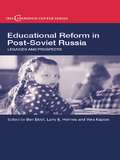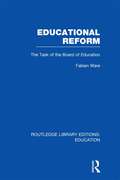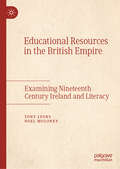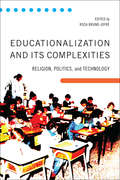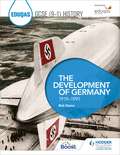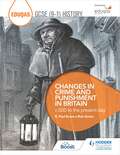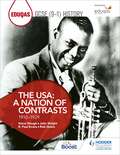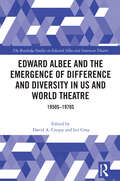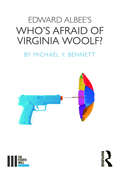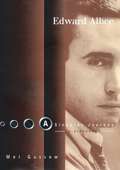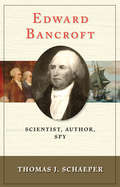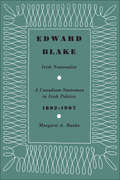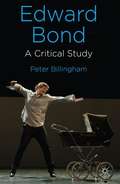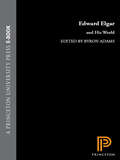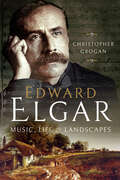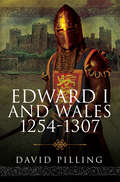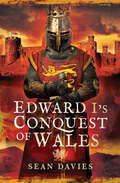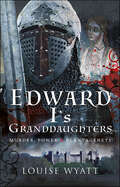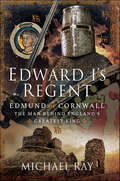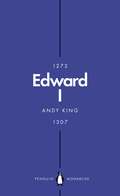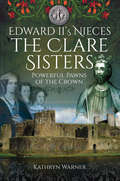- Table View
- List View
Educational Reform in Post-Soviet Russia: Legacies and Prospects (Cummings Center Series #Vol. 20)
by Vera Kaplan Ben Eklof Larry E. HolmesThis volume consists of a collection of essays devoted to study of the most recent educational reform in Russia. In his first decree Boris Yeltsin proclaimed education a top priority of state policy. Yet the economic decline which accompanied the collapse of the Soviet Union dealt a crippling blow to reformist aspirations, and to the existing school system itself. The public lost faith in school reform and by the mid-1990s a reaction had set in. Nevertheless, large-scale changes have been effected in finance, structure, governance and curricula. At the same time, there has been a renewed and widespread appreciation for the positive aspects of the Soviet legacy in schooling.The essays presented here compare current educational reform to reforms of the past, analyze it in a broader cultural, political and social context, and study the shifts that have occurred at the different levels of schooling 'from political decision-making and changes in school administration to the rewriting textbooks and teachers' everyday problems. The authors are both Russian educators, who have played a leading role in implementation of the reform, and Western scholars, who have been studying it from its very early stages. Together, they formulate an intricate but cohesive picture, which is in keeping with the complex nature of the reform itself.Contributors: Kara Brown, (Indiana University) * Ben Eklof (Indiana University) * Isak D. Froumin, (World Bank, Moscow) * Larry E. Holmes (University of South Alabama) * Igor Ionov, (Russian History Institute of the Russian Academy of Sciences) * Viacheslav Karpov & Elena Lisovskaya, (Western Michigan University) * Vera Kaplan, (Tel Aviv University) * Stephen T. Kerr, (University of Washington) * James Muckle, (University of Nottingham) * Nadya Peterson, (Hunter College) * Scott Seregny, (Indiana University-Purdue University Indianapolis) * Alexander Shevyrev, (Moscow State University) * Janet G. Vaillant, (Harvard University)
Educational Reform: The Task of the Board of Education (Routledge Library Editions: Education)
by Fabian WareAs well as examining the history and contemporary state of primary and secondary education in England and Wales at the turn of the 19th Century, this volume provides comparative analyses of the education of Germany, Denmark and the British Empire (particularly India). Commercial, industrial and agricultural education is discussed, as is the training of teachers and methods of assessment.
Educational Resources in the British Empire: Examining Nineteenth Century Ireland and Literacy
by Tony Lyons Noel MoloneyThis book explores the impact of the Lesson Books of the National Board of Education in Ireland in the nineteenth century. The author contextualizes the books used in national schools as well as across the wider British Empire: in doing so, he highlights the influence of the religious, social, political and cultural realms of the time. Firmly grounding the volume in its historical context, the author goes on to explore the contemporary moral climate and social influences, including imperialism, morality, rote-learning and socialization. Through meticulous analysis of each Lesson Book, the author traces the evolution of education in Ireland as a reflection of contemporary society, as it changes and transforms in line with cultural, religious and social changes. This pioneering and comprehensive volume will be of interest and value to students and scholars of education in Ireland as well as education in the British Empire more widely.
Educationalization and Its Complexities: Religion, Politics, and Technology
by Rosa Bruno-JofréThis edited collection brings together scholars from Canadian and international institutions to discuss educationalization, a trend in modern societies that involves transferring social responsibilities onto the school system. This book brings a new dimension to the literature on educationalization by examining the concept in relation to Catholicism, Indigenous issues, the right to education, and historical studies grounded in both Canada and Chile. In these contributions, the book represents an attempt to both deepen the current discussion on the construction and use of educationalization as a concept as well as invite further exploration of this subject in relation to the increasing digitalization of life in the twenty-first century.
Eduqas GCSE (9-1) History (9-1) History (9-1) History (9-1) History (9-1) History (9-1) History (9-1) History (9-1) History (9-1) History (9-1) History (9-1) History (9-1) History (9-1) History (9-1) History (9-1) History (9-1) History: The Development of Germany, 1919-1991: The Development Of Germany 1919-1991
by Rob QuinnExam board: EduqasLevel: GCSESubject: HistoryFirst teaching: September 2016First exams: June 2018Endorsed by EduqasHelp every student to achieve their best, with bespoke support for Eduqas GCSE History from the leading History publisher for secondary schools.Structured around the key questions in the 2016 specification, this book:> Develops in-depth subject knowledge through clear and detailed coverage of the important issues, events and concepts> Builds students' historical skills and thinking as they progress through a range of activities and questions> Prepares students for assessment by providing step-by-step guidance and model answers for each question type> Increases understanding and enjoyment by including a rich variety of source material that brings the period to life
Eduqas GCSE (9-1) History (9-1) History (9-1) History (9-1) History (9-1) History (9-1) History (9-1) History (9-1) History: The Development of Germany, 1919-1991: The Development Of Germany 1919-1991
by Rob QuinnExam board: EduqasLevel: GCSESubject: HistoryFirst teaching: September 2016First exams: June 2018Endorsed by EduqasHelp every student to achieve their best, with bespoke support for Eduqas GCSE History from the leading History publisher for secondary schools.Structured around the key questions in the 2016 specification, this book:> Develops in-depth subject knowledge through clear and detailed coverage of the important issues, events and concepts> Builds students' historical skills and thinking as they progress through a range of activities and questions> Prepares students for assessment by providing step-by-step guidance and model answers for each question type> Increases understanding and enjoyment by including a rich variety of source material that brings the period to life
Eduqas GCSE (9-1) History Changes in Crime and Punishment in Britain c.500 to the present day
by R. Paul Evans Rob QuinnExam board: EduqasLevel: GCSESubject: HistoryFirst teaching: September 2016First exams: June 2018Endorsed by EduqasHelp every student to achieve their best, with bespoke support for Eduqas GCSE History from the leading History publisher for secondary schools.Structured around the key questions in the 2016 specification, this book:> Develops in-depth subject knowledge through clear and detailed coverage of the important themes, perspectives and developments> Builds students' historical skills and thinking as they progress through a range of activities and questions> Prepares students for assessment by providing step-by-step guidance and model answers for each question type> Increases understanding and enjoyment by including a rich variety of source material that brings different periods to life
Eduqas GCSE (9-1) History Changes in Crime and Punishment in Britain c.500 to the present day
by R. Paul Evans Rob QuinnExam board: EduqasLevel: GCSESubject: HistoryFirst teaching: September 2016First exams: June 2018Endorsed by EduqasHelp every student to achieve their best, with bespoke support for Eduqas GCSE History from the leading History publisher for secondary schools.Structured around the key questions in the 2016 specification, this book:> Develops in-depth subject knowledge through clear and detailed coverage of the important themes, perspectives and developments> Builds students' historical skills and thinking as they progress through a range of activities and questions> Prepares students for assessment by providing step-by-step guidance and model answers for each question type> Increases understanding and enjoyment by including a rich variety of source material that brings different periods to life
Eduqas GCSE (9-1) History The USA (9-1) History The USA (9-1) History The USA (9-1) History The USA (9-1) History The USA (9-1) History The USA (9-1) History The USA (9-1) History The USA: A Nation of Contrasts 1910-1929: A Nation Of Contrasts 1910-1929
by John Wright Steve Waugh R. Paul Evans Rob QuinnExam board: EduqasLevel: GCSESubject: HistoryFirst teaching: September 2016First exams: June 2018Endorsed by EduqasHelp every student to achieve their best, with bespoke support for Eduqas GCSE History from the leading History publisher for secondary schools.Structured around the key questions in the 2016 specification, this book:> Develops in-depth subject knowledge through clear and detailed coverage of the important issues, events and concepts> Builds students' historical skills and thinking as they progress through a range of activities and questions> Prepares students for assessment by providing step-by-step guidance and model answers for each question type> Increases understanding and enjoyment by including a rich variety of source material that brings the period to life
Eduqas GCSE (9-1) History The USA (9-1) History The USA: A Nation of Contrasts 1910-1929: A Nation Of Contrasts 1910-1929
by John Wright Steve Waugh R. Paul Evans Rob QuinnExam board: EduqasLevel: GCSESubject: HistoryFirst teaching: September 2016First exams: June 2018Endorsed by EduqasHelp every student to achieve their best, with bespoke support for Eduqas GCSE History from the leading History publisher for secondary schools.Structured around the key questions in the 2016 specification, this book:> Develops in-depth subject knowledge through clear and detailed coverage of the important issues, events and concepts> Builds students' historical skills and thinking as they progress through a range of activities and questions> Prepares students for assessment by providing step-by-step guidance and model answers for each question type> Increases understanding and enjoyment by including a rich variety of source material that brings the period to life
Edward Albee and the Emergence of Difference and Diversity in US and World Theatre: 1950s-1970s (Routledge Studies in Edward Albee and American Theatre)
by Les Gray David A. CrespyThis collection of essays seeks to present articles that examine the early ventures of the 1960s and 1970s in the progressive theatre of identity with a new contemporary view, considering the intersection of race, gender, ethnicity, economic class, and sexual orientation.In 1964, Edward Albee and his producers, Richard Barr and Clinton Wilder, produced Funnyhouse of a Negro by Adrienne Kennedy, and Dutchman by Amiri Baraka (then, Leroi Jones), and by 1968, had produced the seminal gay drama, The Boys in the Band by Mart Crowley. No other major American playwright of this period (including Thornton Wilder, Arthur Miller, Tennessee Williams, or William Inge) produced the plays of their junior colleagues with a specific focus on difference and diversity. For most scholars, these productions and Albee’s involvement in them are a somewhat obscure footnote in theatre history. But they remain important for their early support of diverse voices. Even as Albee’s career was skyrocketing, he and his producers had begun a producing project that sowed the seeds of diversity, equity, and inclusion in a decidedly anti-racist, decolonizing, and progressive move that still resonates powerfully today. While this book is not a hagiography and does not intend to paint Albee as without his own critical failings in terms of diversity in his own work and that of others, this volume of theatre history, dramatic literature, and performance essays takes a detailed, critical approach to Albee’s engagement with other initiating plays, productions, producers, theatre companies, theatre artists, and performances in the United States that pushed the dial toward difference and diversity in the late 1950s through the late 1970s, beginning the formations of new theatres of identity across the United States.This volume will be of great interest to students and scholars in theatre and performance studies.
Edward Albee's Who's Afraid of Virginia Woolf? (The Fourth Wall)
by Michael Y. BennettEdward Albee’s Who’s Afraid of Virginia Woolf? shocked audiences and critics alike with its assault on decorum. At base though, the play is simply a love story: an examination of a long-wedded life, filled with the hopes, dreams, disappointments, and pain that accompany the passing of many years together. While the ethos of the play is tragicomic, it is the anachronistic, melodramatic secret object—the nonexistent "son"—that upends the audience’s sense of theatrical normalcy. The mean and vulgar bile spewed among the characters hides these elements, making it feel like something entirely "new." As Michael Y. Bennett reveals, the play is the same emperor, just wearing new clothes. In short, it is straight out of the grand tradition of living room drama: Ibsen, Chekhov, Glaspell, Hellmann, O’Neill, Wilder, Miller, Williams, and Albee.
Edward Albee: A Biography
by Mel GussowIn 1960, Edward Albee electrified the theater world with the American premiere of The Zoo Story, and followed it two years later with his extraordinary first Broadway play, Who's Afraid of Virginia Woolf? Proclaimed as the playwright of his generation, he went on to win three Pulitzer Prizes for his searing and innovative plays. Mel Gussow, author, critic, and cultural writer for The New York Times, has known Albee and followed his career since its inception, and in this fascinating biography he creates a compelling firsthand portrait of a complex genius.The book describes Albee's life as the adopted child of rich, unloving parents and covers the highs and lows of his career. A core myth of Albee's life, perpetuated by the playwright, is that The Zoo Story was his first play, written as a thirtieth birthday present to himself. As Gussow relates, Albee has been writing since adolescence, and through close analysis the author traces the genesis of Who's Afraid of Virginia Woolf?, Tiny Alice, A Delicate Balance, and other plays. After his early triumphs, Albee endured years of critical neglect and public disfavor. Overcoming artistic and personal difficulties, he returned in 1994 with Three Tall Women. In this prizewinning play he came to terms with the towering figure of his mother, the woman who dominated so much of his early life.With frankness and critical acumen, and drawing on extensive conversations with the playwright, Gussow offers fresh insights into Albee's life. At the same time he provides vivid portraits of Albee's relationships with the people who have been closest to him, including William Flanagan (his first mentor), Thornton Wilder, Richard Barr, John Steinbeck, Alan Schneider, John Gielgud, and his leading ladies, Uta Hagen, Colleen Dewhurst, Irene Worth, Myra Carter, Elaine Stritch, Marian Seldes, and Maggie Smith. And then there are, most famously, Elizabeth Taylor and Richard Burton, who starred in Mike Nichols's acclaimed film version of Who's Afraid of Virginia Woolf? The book places Albee in context as a playwright who inspired writers as diverse as John Guare and Sam Shepard, and as a teacher and champion of human rights.Edward Albee: A Singular Journey is rich with colorful details about this uniquely American life. It also contains previously unpublished photographs and letters from and to Albee. It is the essential book about one of the major artists of the American theater.
Edward Bancroft: Scientist, Author, Spy
by Thomas J. SchaeperA man of as many names as motives, Edward Bancroft is a singular figure in the history of Revolutionary America. Born in Massachusetts in 1745, Bancroft moved to England as a young man in the 1760s and began building a respectable résumé as both a scientist and a man of letters. In recognition of his works in natural history, Bancroft was unanimously elected to the Royal Society, and while working to secure French aid for the American Revolution, he became a close associate of such luminaries as Benjamin Franklin, Silas Deane, and John Adams. Though lauded in his time as a staunch American patriot, when the British diplomatic archives were opened in the late nineteenth century, it was revealed that Bancroft led a secret life as a British agent acting against French and American interests. In this book, the first complete biography of Bancroft, historian Thomas J. Schaeper reveals the full extent of the agent's deception during the crucial years of the American Revolution. Operating under aliases, working in ciphers, and leaving coded messages in the trees of Paris's Tuileries Gardens, Bancroft filtered information from unsuspecting figures including Franklin and Deane back to his contacts in Britain, navigating a complicated web of political allegiances. Through Schaeper's keen analysis of Bancroft's correspondence and diplomatic records, this biography reveals whether Bancroft should ultimately be considered a traitor to America or a patriot to Britain.
Edward Blake: Irish Nationalist, A Canadian Statesman in Irish Politics
by Margaret A. BanksIn 1892, Edward Blake, ex-Premier of Ontario and former leader of the Liberal party in the Canadian House of Common, was invited by the Irish parliamentary party to stand for election in the British Parliament. This surprising invitation grew out of the conflicts of the Irish "Home Rule" controversy, then a critical issue in British politics. When Blake abandoned the Canadian political scene he had just severed connections with the Liberal party, which he had served as Minister of justice in the only federal Liberal administration down to 1896, and as Leader of the Opposition from 1880 to 1887. Irish Home Rule was a cause which engaged the sympathies of Liberals all over the British Empire, and although Blake intended to return permanently to Canada, he remained a member of the British Parliament, devoting ceaseless efforts to the Irish interest, until illness forced his retirement in 1907.Up to the present time, little attention has been given by either Irish or Canadian historians to the Irish career of Edward Blake. It spanned the years of failure and frustration which stretched between the spectacular period of Gladstone and Parnell to the excitements of the third Home Rule Bill, the Ulster resistance, and the Sinn Fein movement. Although Blake declined much part in parliamentary debate during these arid years, he played a vital and unappreciated role in the inner discussions and struggles of the Irish Nationalist movement. Blake was not only a statesman of blameless reputation, but a constitutional authority whose superior abilities were lying unused in Canada after Confederation. He brought to the Irish party a cool judgment, and a consciousness of the role of statesmanship in politics, which won the highest respect of all its leaders, including McCarthy and Redmond.Dr. Banks has made a searching assessment of Blake's historical position: the reason why, in the eyes of his contemporaries, he never attained the political status which he merited, and the basis for the enormous respect which he was accorded by all who worked with him in the inner circles of the party. It is an informative account, based on careful research, of an enigmatic figure in Canadian politics, whose career encountered unequalled frustrations and discouragement, but whom Sir Wilfrid Laurier unhesitatingly termed "the most powerful intellectual force in Canadian political history." Of interest to everyone concerned with Irish and Imperial problems, it will merit the attention of political analysts and historians alike.
Edward Bond: A Critical Study
by Peter BillinghamThis new study of one of Britain's greatest modern playwrights represents the first major, extended discussion of Edward Bond's work in over twenty years. The book combines rigorous and stimulating analysis and discussion of Bond's plays and ideas about drama and society. For the first time, there is also discussion of selected plays from his later, post-2000 period, including Innocence and Have I None, alongside explorations of widely studied plays such as Saved.
Edward Elgar and His World
by Byron AdamsEdward Elgar (1857-1934) is undoubtedly one of the most fascinating, important, and influential figures in the history of British music. He rose from humble beginnings and achieved fame with music that to this day is beloved by audiences in England, and his work has secured an enduring legacy worldwide. Leading scholars examine the composer's life in Edward Elgar and His World, presenting a comprehensive portrait of both the man and the age in which he lived. Elgar's achievement is remarkably varied and wide-ranging, from immensely popular works like the famous Pomp and Circumstance March no. 1--a standard feature of American graduations--to sweeping masterpieces like his great oratorio The Dream of Gerontius. The contributors explore Elgar's Catholicism, which put him at odds with the prejudices of Protestant Britain; his glorification of British colonialism; his populist tendencies; his inner life as an inspired autodidact; the aristocratic London drawing rooms where his reputation was made; the class prejudice with which he contended throughout his career; and his anguished reaction to World War I. Published in conjunction with the 2007 Bard Music Festival and the 150th anniversary of Elgar's birth, this elegant and thought-provoking volume illuminates the greatness of this accomplished English composer and brings vividly to life the rich panorama of Victorian and Edwardian Britain. The contributors are Byron Adams, Leon Botstein, Rachel Cowgill, Sophie Fuller, Daniel M. Grimley, Nalini Ghuman Gwynne, Deborah Heckert, Charles Edward McGuire, Matthew Riley, Alison I. Shiel, and Aidan J. Thomson.
Edward Elgar: Music, Life and Landscapes
by Christopher GroganThe first full-length study of the English composer’s complex interaction with his physical environment, and its new relevance in the 21st century.More perhaps than any other composer, Edward Elgar (1857-1934) has gained the status of an “icon of locality,” his music seemingly inextricably linked to the English landscape in which he worked. This, the first full-length study of Elgar’s complex interaction with his physical environment, explores how it is that such associations are formed and whether it is in any sense true that Elgar alchemized landscape into music.It argues that Elgar stands at the apex of an English tradition, going back to Blake, in which creative artists in all media have identified and warned against the self-harm of environmental degradation and that, following a period in which these ideas were swept away by the swift but shallow tide of Modernism in the decades after the First World War, they have since resurfaced with a new relevance and urgency for twenty-first century society.Written with the non-specialist in mind, yet drawing on the rich resources of post-millennial scholarship on Elgar, as well as geographical studies of place, the book also includes many new insights relating to such aspects of Elgar’s output as his use of landscape typology in The Apostles, and his encounter with Modernism in the late chamber music. It also calls on the resources of contemporary social commentary, poetry and, especially, English landscape art to place Elgar and his thought in the broader cultural milieu of his time. A survey of recent recordings is included, in the hope that listeners, both familiar and unfamiliar with Elgar’s music, will feel inspired to embark on a voyage of (re)discovery of its endlessly rewarding treasures.
Edward I and Wales, 1254–1307
by David PillingThe late 13th century witnessed the conquest of Wales after two hundred years of conflict between Welsh princes and the English crown. In 1282 Llywelyn ap Gruffudd, the only native Prince of Wales to be formally acknowledged by a King of England, was slain by English forces. His brother Dafydd continued the fight, but was eventually captured and executed. Further revolts followed under Rhys ap Maredudd, a former crown ally, and Madog ap Llywelyn, a kinsman of the defeated lords of Gwynedd. The Welsh wars were a massive undertaking for the crown, and required the mobilization of all resources. Edward’s willingness to direct the combined power of the English state and church against the Prince of Wales, to an unprecedented degree, resulted in a victory that had eluded all of his predecessors. This latest study of the Welsh wars of Edward I will draw upon recently translated archive material, allowing a fresh insight into military and political events. Edward’s personal relationship with Welsh leaders is also reconsidered. Traditionally, the conquest is dated to the fall of Llywelyn in December 1282, but this book will argue that Edward was not truly the master of Wales until 1294. In the years between those two dates he broke the power of the great Marcher lords and crushed two further large-scale revolts against crown authority. After 1294 he was able to exploit Welsh manpower on a massive scale. His successors followed the same policy during the Scottish wars and the Hundred Years War. Edward enjoyed considerable support among the ‘uchelwyr’ or Welsh gentry class, many of whom served him as diplomats and spies as well as military captains. This aspect of the king’s complex relationship with the Welsh will also feature.
Edward I and the Governance of England, 1272-1307
by Caroline BurtThis important exploration of the reign of Edward I – one of England's most lionised, feared and successful monarchs – presents his kingship in a radical new light. Through detailed case studies of Shropshire, Warwickshire and Kent, Caroline Burt examines how Edward's governance at a national level was reflected in different localities. She employs novel methodology to measure levels of disorder and the effects of government action, and uncovers a remarkably sophisticated approach to governance. This study combines an empirical examination of government with an understanding of developing political ideas and ideological motivation and contributes towards a greater understanding of the development of local government and politics in England in the thirteenth and fourteenth centuries. Edward emerges as a king with a coherent set of ideas about the governance of his realm, both intellectually and practically, whose achievements were even more remarkable than has previously been recognised.
Edward I's Conquest of Wales
by Sean DaviesA study of medieval warfare and a formative event in the history of Britain. Edward I&’s conquest of Wales has not been the subject of a scholarly book for over a century. Research has advanced since then, changing our perception of the medieval military mind and shining fresh light on the key characters involved in the conquest. That is why Sean Davies&’s absorbing new study is so timely and important. Taking a balanced approach, he gives both the Welsh and English perspectives on the war and on the brutal, mistrustful, and ruthless personal motives that drove events. His account is set in the context of Welsh warfare and society from the end of Rome to the time of Edward&’s opening campaign in the late thirteenth century. The narrative describes in vivid detail the military history of the conflict; the sequence of campaigns; Welsh resistance; Edward&’s castle building and English colonization; the cost of the struggle to the Welsh and the English; and the uneasy peace that followed.
Edward I's Granddaughters: Murder, Power & Plantagenets
by Louise WyattEdward I and his offspring, especially Edward II, are not shrouded by the mists of time. Edward I’s two sons and daughter by his second marriage are lesser known, especially the eldest, Thomas Plantagenet of Brotherton. He made no particular impression on history, despite being Earl of Norfolk and Earl Marshal, but Thomas did father three children. Of these, only one is usually remembered: Margaret of Norfolk. Indomitable, defiant, respected and fiercely intelligent, she defied her cousin Edward III more than once and outlived most of her family. Her brother Edward of Norfolk died young but her sister, Alice of Norfolk, survived childhood. But not for long. In 1338, by the time she was fourteen, Alice was married to Sir Edward Montagu, younger brother of the famous earl of Salisbury, William Montagu and Bishop of Ely, Simon Montagu. Edward was a warrior knight at Crecy, involved in the wars with Scotland, loyal to his brother and his king. The marriage produced five children within a decade, but by 1350 Edward Montagu was showing his dark side and was part of the knightly criminal gangs that terrorized local areas. One day in June 1351, Alice of Norfolk paid the price. Despite being a Plantagenet, daughter of an earl, granddaughter, niece and cousin to kings, Alice of Norfolk has mostly been forgotten. Even looking at contemporary records, Alice hardly features apart from land and property dealings with her husband. A dusty reference to the unfortunate circumstances of her death marks the end of her life and one which will more than likely remain a mystery.
Edward I's Regent: Edmund of Cornwall, The Man Behind England’s Greatest King
by Michael RayBorn at Christmas 1249 to Richard, Edmund of Cornwall was nephew to Henry III and cousin to Edward I. His eventful childhood took him to Germany when his father was elected king there. He was captured at the battle of Lewes and imprisoned for more than a year. Returning from crusade, he witnessed the brutal murder of his half-brother, which left him as heir to his father, the richest man in the kingdom. Throughout his life, Edmund played a crucial role in medieval England. As Regent of England, Earl of Cornwall and the richest man in the land, he was a leading force of the late-thirteenth century. This book considers Edmund’s life, his use of his wealth to lend to the king and others and to be a major benefactor of religious houses. His piety saw him found two new religious houses, rebuild another and bring the Holy Blood relic from Germany to Hailes abbey. His record as Regent of England for three years is assessed. The wide spread of his lands, which included 13castles and more than 800 places in 27 counties, and his tenants are set out as is his place in the local community. The basis of his wealth and its sources, including money from his lands but also from tin mining and marine dues in Cornwall, is explored and his knightly affinity and his close associates and officials are considered. On a personal level, the book examines his unsuccessful, childless marriage with the sister of the Earl of Gloucester. Edmund was a key figure throughout Edward I's rein and the late-thirteenth century. In this insightful account, the man behind England's 'greatest king' is at long last brought to the fore.
Edward I: A New King Arthur? (Penguin Monarchs)
by Andy KingThe acclaimed Penguin Monarchs series: short, fresh, expert accounts of England's rulers - now in paperbackEdward I (1272-1307) is one of the most commanding of all English rulers. He fought in southwest France, in Wales, In Scotland and in northern France, he ruled with ruthlessness and confidence, undoing the chaotic failure of his father, Henry III's reign. He reshaped England's legal system and came close to bringing the whole island of Great Britain under his rule. He promoted the idea of himself as the new King Arthur, his Round Table still hanging in Winchester Castle to this day. His greatest monuments are the extraordinary castles - Caernarfon, Beaumaris, Harlech and Conwy - built to ensure his rule of Wales and some of the largest of all medieval buildings.Andy King's brilliant short biography brings to life a strange, complex man whose triumphs raise all kinds of questions about the nature of kingship - how could someone who established so many key elements in England's unique legal and parliamentary system also have been such a harsh, militarily brutal warrior?
Edward II's Nieces, The Clare Sisters: Powerful Pawns of the Crown
by Kathryn Warner“A great book to introduce you to three fascinating sisters whose marriages during the reign of the infamous Edward II transformed England.” —Adventures of a Tudor NerdThe de Clare sisters Eleanor, Margaret and Elizabeth were born in the 1290s as the eldest granddaughters of King Edward I of England and his Spanish queen Eleanor of Castile, and were the daughters of the greatest nobleman in England, Gilbert “the Red” de Clare, Earl of Gloucester. They grew to adulthood during the turbulent reign of their uncle Edward II, and all three of them were married to men involved in intense, probably romantic or sexual, relationships with their uncle.When their elder brother Gilbert de Clare, Earl of Gloucester, was killed during their uncle’s catastrophic defeat at the battle of Bannockburn in June 1314, the three sisters inherited and shared his vast wealth and lands in three countries, but their inheritance proved a poisoned chalice. Eleanor and Elizabeth, and Margaret’s daughter and heir, were all abducted and forcibly married by men desperate for a share of their riches, and all three sisters were imprisoned at some point either by their uncle Edward II or his queen Isabella of France during the tumultuous decade of the 1320s. Elizabeth was widowed for the third time at twenty-six, lived as a widow for just under forty years, and founded Clare College at the University of Cambridge.“Another enjoyable read on women in history that don’t always get the limelight that they deserve. Kathryn Warner has done it once again by providing a well-written, well-researched, informative and engaging read.” —Where There’s Ink There’s Paper
